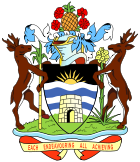You can help expand this article with text translated from the corresponding article in Spanish. (March 2024)Click [show] for important translation instructions.
|
| ||||||||||||||||||||||||||||
All 10 seats in the Legislative Council 6 seats needed for a majority | ||||||||||||||||||||||||||||
|---|---|---|---|---|---|---|---|---|---|---|---|---|---|---|---|---|---|---|---|---|---|---|---|---|---|---|---|---|
| Turnout | 37.98% ( | |||||||||||||||||||||||||||
| ||||||||||||||||||||||||||||
 Results by constituency | ||||||||||||||||||||||||||||
| ||||||||||||||||||||||||||||
 |
|---|
General elections were held in Antigua and Barbuda on 29 November 1960. [1] They were won by the governing Antigua Labour Party (ALP), whose leader Vere Bird was re-elected as Chief Minister, a position he had held since 1 January 1960 when the position was created. [2]
The 1960 elections were the only general elections held in the territory during its membership of the West Indies Federation, a brief attempt to create a federal state in the British West Indies. Voter turnout was 38%.
